Artificial Intelligence in Healthcare: Methodologies and Future Implications
VerifiedAdded on 2023/06/10
|14
|3149
|228
AI Summary
This article discusses the impact of artificial intelligence in healthcare and its future implications. It explores the methodologies used in research, including qualitative and quantitative research designs, and the benefits and limitations of each. The proposed methodology is a mixed research design that combines both qualitative and quantitative research methods. The framework of the methodology includes an inductive approach and a survey through a questionnaire.
Contribute Materials
Your contribution can guide someone’s learning journey. Share your
documents today.

Running head: INFORMATION TECHNOLOGY
Secure Best Marks with AI Grader
Need help grading? Try our AI Grader for instant feedback on your assignments.
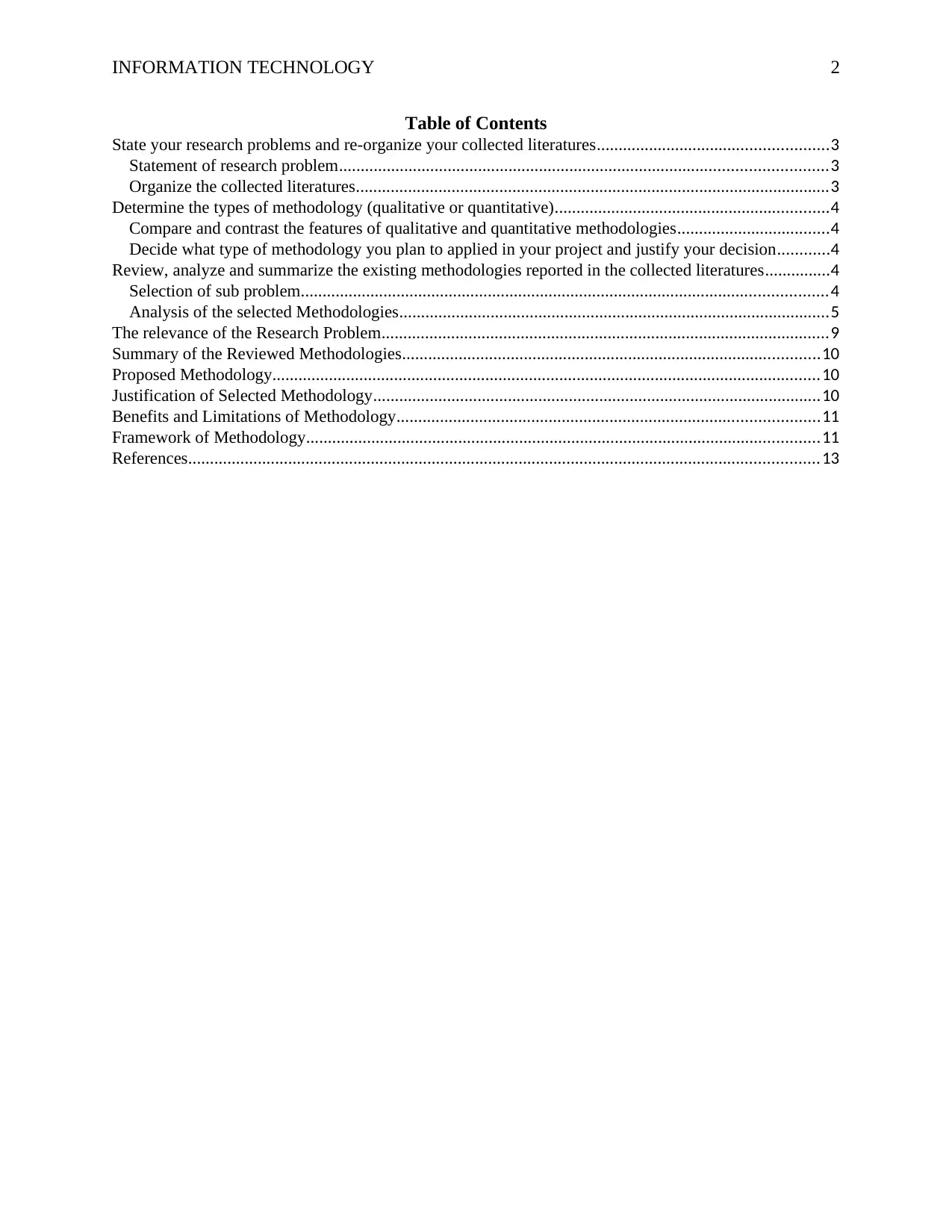
INFORMATION TECHNOLOGY 2
Table of Contents
State your research problems and re-organize your collected literatures.....................................................3
Statement of research problem................................................................................................................3
Organize the collected literatures.............................................................................................................3
Determine the types of methodology (qualitative or quantitative)...............................................................4
Compare and contrast the features of qualitative and quantitative methodologies...................................4
Decide what type of methodology you plan to applied in your project and justify your decision............4
Review, analyze and summarize the existing methodologies reported in the collected literatures...............4
Selection of sub problem.........................................................................................................................4
Analysis of the selected Methodologies...................................................................................................5
The relevance of the Research Problem.......................................................................................................9
Summary of the Reviewed Methodologies................................................................................................10
Proposed Methodology..............................................................................................................................10
Justification of Selected Methodology.......................................................................................................10
Benefits and Limitations of Methodology.................................................................................................11
Framework of Methodology......................................................................................................................11
References.................................................................................................................................................13
Table of Contents
State your research problems and re-organize your collected literatures.....................................................3
Statement of research problem................................................................................................................3
Organize the collected literatures.............................................................................................................3
Determine the types of methodology (qualitative or quantitative)...............................................................4
Compare and contrast the features of qualitative and quantitative methodologies...................................4
Decide what type of methodology you plan to applied in your project and justify your decision............4
Review, analyze and summarize the existing methodologies reported in the collected literatures...............4
Selection of sub problem.........................................................................................................................4
Analysis of the selected Methodologies...................................................................................................5
The relevance of the Research Problem.......................................................................................................9
Summary of the Reviewed Methodologies................................................................................................10
Proposed Methodology..............................................................................................................................10
Justification of Selected Methodology.......................................................................................................10
Benefits and Limitations of Methodology.................................................................................................11
Framework of Methodology......................................................................................................................11
References.................................................................................................................................................13
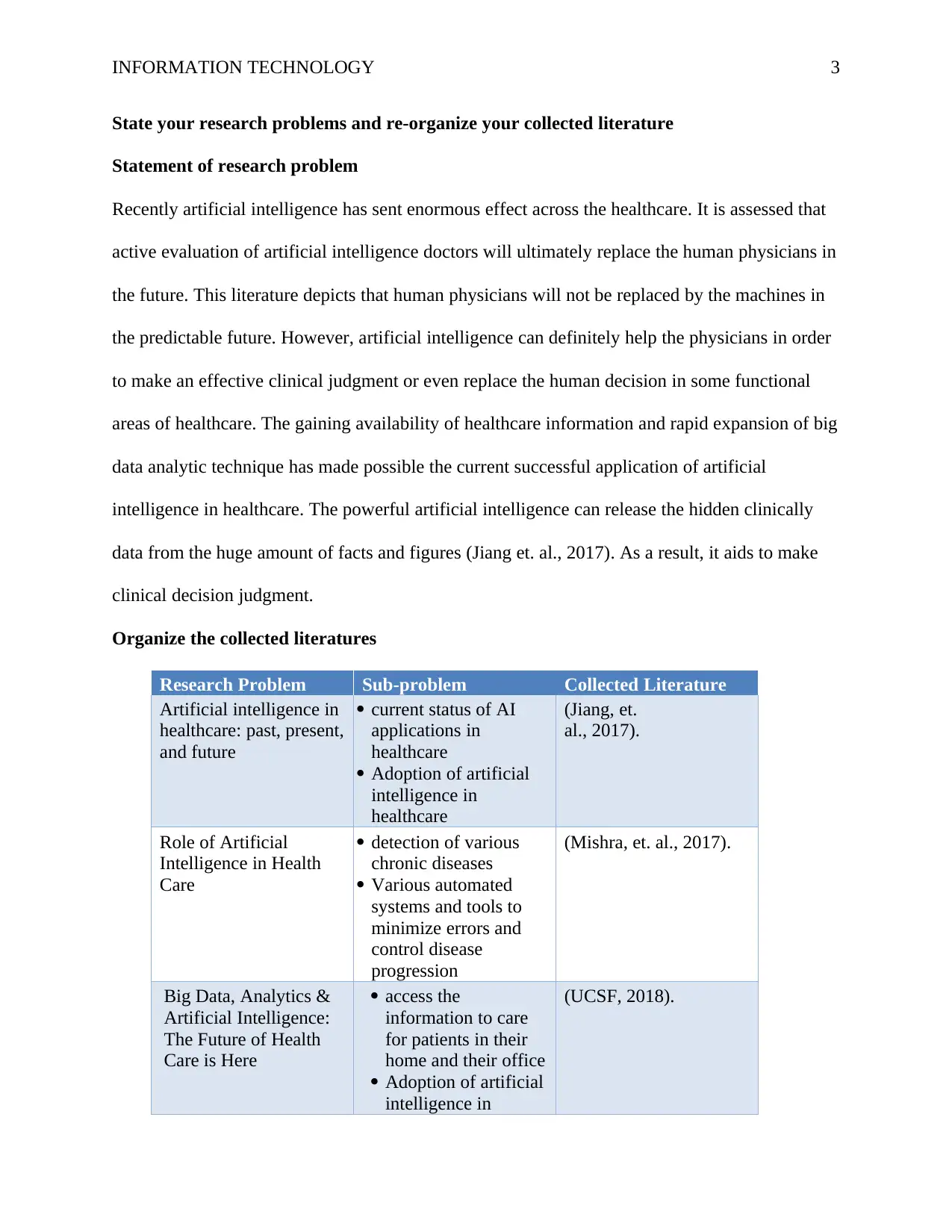
INFORMATION TECHNOLOGY 3
State your research problems and re-organize your collected literature
Statement of research problem
Recently artificial intelligence has sent enormous effect across the healthcare. It is assessed that
active evaluation of artificial intelligence doctors will ultimately replace the human physicians in
the future. This literature depicts that human physicians will not be replaced by the machines in
the predictable future. However, artificial intelligence can definitely help the physicians in order
to make an effective clinical judgment or even replace the human decision in some functional
areas of healthcare. The gaining availability of healthcare information and rapid expansion of big
data analytic technique has made possible the current successful application of artificial
intelligence in healthcare. The powerful artificial intelligence can release the hidden clinically
data from the huge amount of facts and figures (Jiang et. al., 2017). As a result, it aids to make
clinical decision judgment.
Organize the collected literatures
Research Problem Sub-problem Collected Literature
Artificial intelligence in
healthcare: past, present,
and future
current status of AI
applications in
healthcare
Adoption of artificial
intelligence in
healthcare
(Jiang, et.
al., 2017).
Role of Artificial
Intelligence in Health
Care
detection of various
chronic diseases
Various automated
systems and tools to
minimize errors and
control disease
progression
(Mishra, et. al., 2017).
Big Data, Analytics &
Artificial Intelligence:
The Future of Health
Care is Here
access the
information to care
for patients in their
home and their office
Adoption of artificial
intelligence in
(UCSF, 2018).
State your research problems and re-organize your collected literature
Statement of research problem
Recently artificial intelligence has sent enormous effect across the healthcare. It is assessed that
active evaluation of artificial intelligence doctors will ultimately replace the human physicians in
the future. This literature depicts that human physicians will not be replaced by the machines in
the predictable future. However, artificial intelligence can definitely help the physicians in order
to make an effective clinical judgment or even replace the human decision in some functional
areas of healthcare. The gaining availability of healthcare information and rapid expansion of big
data analytic technique has made possible the current successful application of artificial
intelligence in healthcare. The powerful artificial intelligence can release the hidden clinically
data from the huge amount of facts and figures (Jiang et. al., 2017). As a result, it aids to make
clinical decision judgment.
Organize the collected literatures
Research Problem Sub-problem Collected Literature
Artificial intelligence in
healthcare: past, present,
and future
current status of AI
applications in
healthcare
Adoption of artificial
intelligence in
healthcare
(Jiang, et.
al., 2017).
Role of Artificial
Intelligence in Health
Care
detection of various
chronic diseases
Various automated
systems and tools to
minimize errors and
control disease
progression
(Mishra, et. al., 2017).
Big Data, Analytics &
Artificial Intelligence:
The Future of Health
Care is Here
access the
information to care
for patients in their
home and their office
Adoption of artificial
intelligence in
(UCSF, 2018).
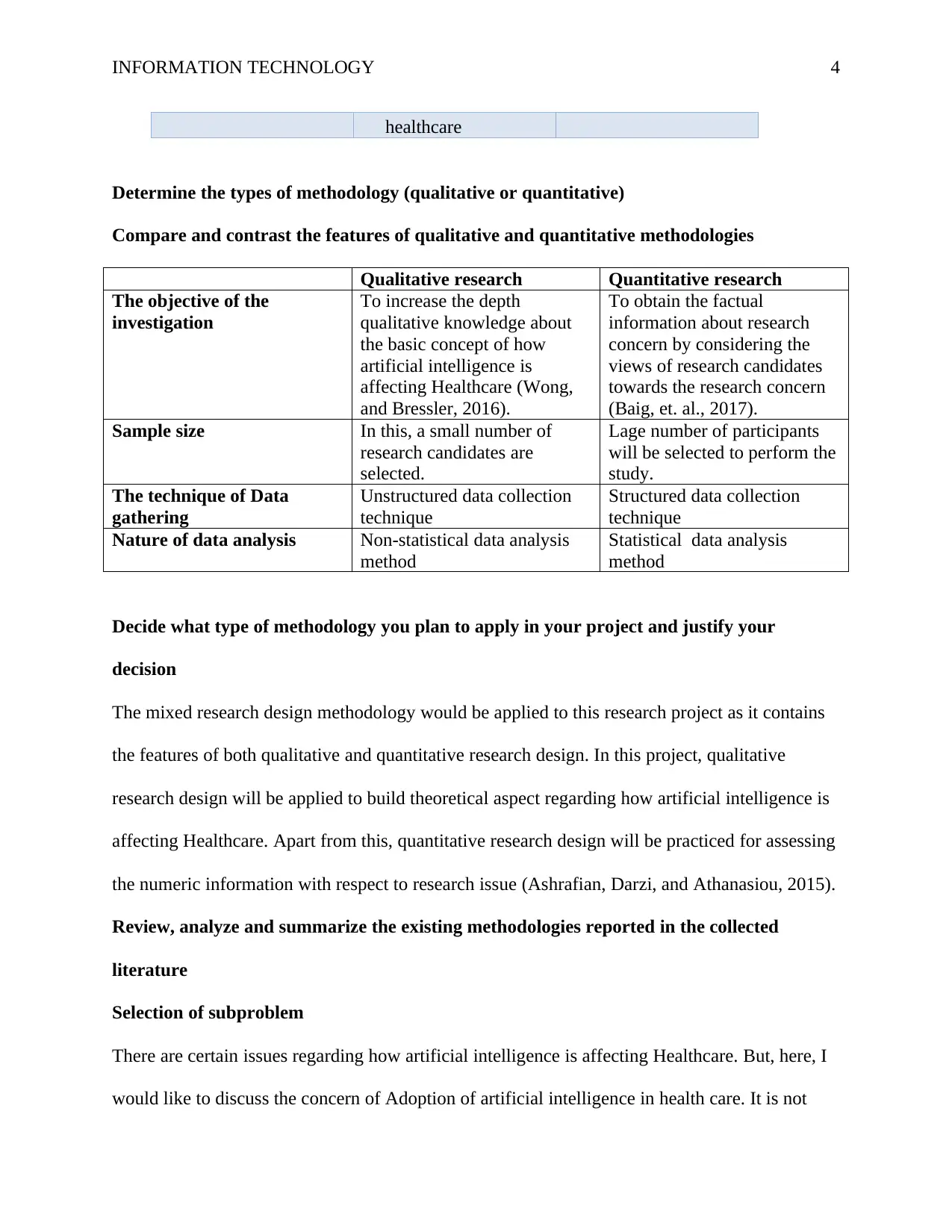
INFORMATION TECHNOLOGY 4
healthcare
Determine the types of methodology (qualitative or quantitative)
Compare and contrast the features of qualitative and quantitative methodologies
Qualitative research Quantitative research
The objective of the
investigation
To increase the depth
qualitative knowledge about
the basic concept of how
artificial intelligence is
affecting Healthcare (Wong,
and Bressler, 2016).
To obtain the factual
information about research
concern by considering the
views of research candidates
towards the research concern
(Baig, et. al., 2017).
Sample size In this, a small number of
research candidates are
selected.
Lage number of participants
will be selected to perform the
study.
The technique of Data
gathering
Unstructured data collection
technique
Structured data collection
technique
Nature of data analysis Non-statistical data analysis
method
Statistical data analysis
method
Decide what type of methodology you plan to apply in your project and justify your
decision
The mixed research design methodology would be applied to this research project as it contains
the features of both qualitative and quantitative research design. In this project, qualitative
research design will be applied to build theoretical aspect regarding how artificial intelligence is
affecting Healthcare. Apart from this, quantitative research design will be practiced for assessing
the numeric information with respect to research issue (Ashrafian, Darzi, and Athanasiou, 2015).
Review, analyze and summarize the existing methodologies reported in the collected
literature
Selection of subproblem
There are certain issues regarding how artificial intelligence is affecting Healthcare. But, here, I
would like to discuss the concern of Adoption of artificial intelligence in health care. It is not
healthcare
Determine the types of methodology (qualitative or quantitative)
Compare and contrast the features of qualitative and quantitative methodologies
Qualitative research Quantitative research
The objective of the
investigation
To increase the depth
qualitative knowledge about
the basic concept of how
artificial intelligence is
affecting Healthcare (Wong,
and Bressler, 2016).
To obtain the factual
information about research
concern by considering the
views of research candidates
towards the research concern
(Baig, et. al., 2017).
Sample size In this, a small number of
research candidates are
selected.
Lage number of participants
will be selected to perform the
study.
The technique of Data
gathering
Unstructured data collection
technique
Structured data collection
technique
Nature of data analysis Non-statistical data analysis
method
Statistical data analysis
method
Decide what type of methodology you plan to apply in your project and justify your
decision
The mixed research design methodology would be applied to this research project as it contains
the features of both qualitative and quantitative research design. In this project, qualitative
research design will be applied to build theoretical aspect regarding how artificial intelligence is
affecting Healthcare. Apart from this, quantitative research design will be practiced for assessing
the numeric information with respect to research issue (Ashrafian, Darzi, and Athanasiou, 2015).
Review, analyze and summarize the existing methodologies reported in the collected
literature
Selection of subproblem
There are certain issues regarding how artificial intelligence is affecting Healthcare. But, here, I
would like to discuss the concern of Adoption of artificial intelligence in health care. It is not
Secure Best Marks with AI Grader
Need help grading? Try our AI Grader for instant feedback on your assignments.
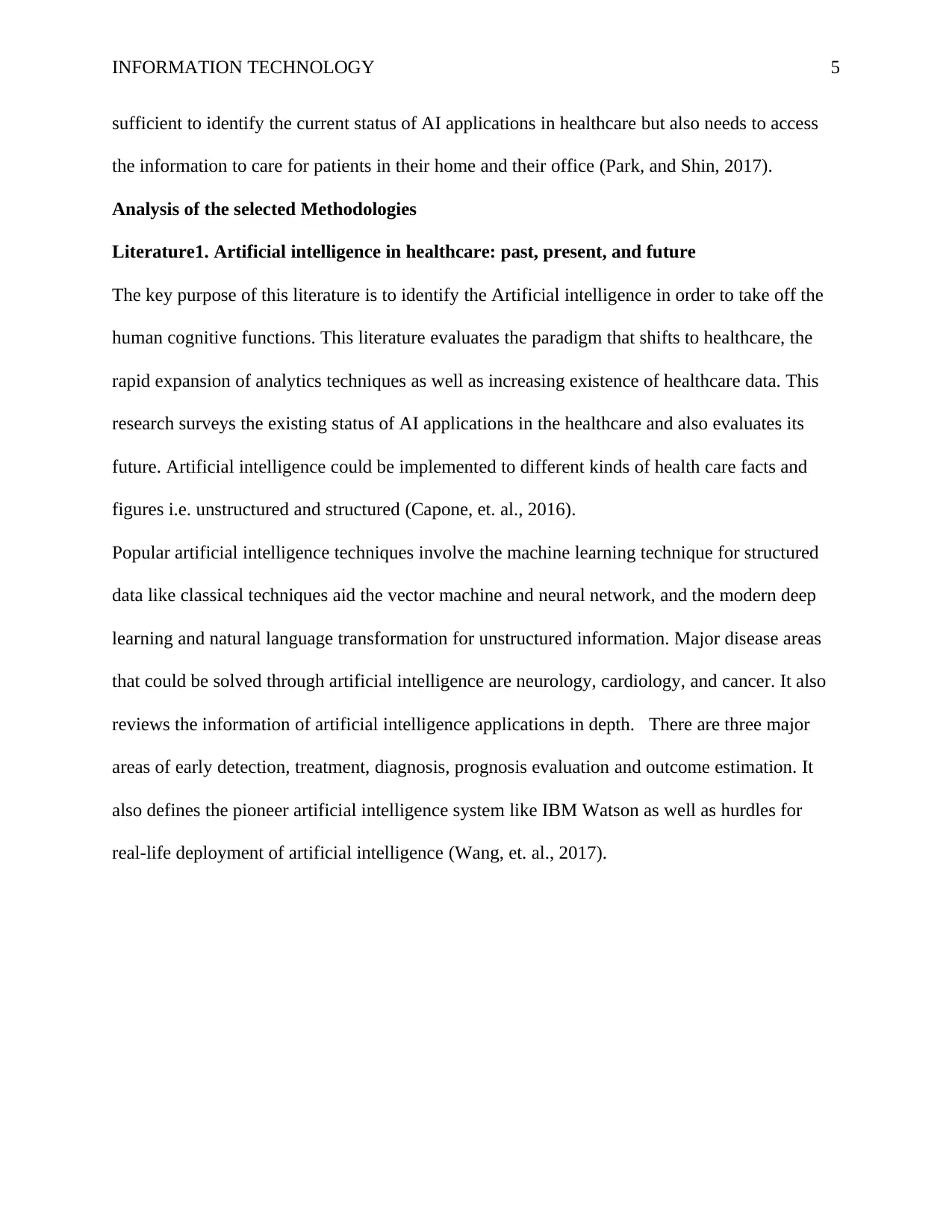
INFORMATION TECHNOLOGY 5
sufficient to identify the current status of AI applications in healthcare but also needs to access
the information to care for patients in their home and their office (Park, and Shin, 2017).
Analysis of the selected Methodologies
Literature1. Artificial intelligence in healthcare: past, present, and future
The key purpose of this literature is to identify the Artificial intelligence in order to take off the
human cognitive functions. This literature evaluates the paradigm that shifts to healthcare, the
rapid expansion of analytics techniques as well as increasing existence of healthcare data. This
research surveys the existing status of AI applications in the healthcare and also evaluates its
future. Artificial intelligence could be implemented to different kinds of health care facts and
figures i.e. unstructured and structured (Capone, et. al., 2016).
Popular artificial intelligence techniques involve the machine learning technique for structured
data like classical techniques aid the vector machine and neural network, and the modern deep
learning and natural language transformation for unstructured information. Major disease areas
that could be solved through artificial intelligence are neurology, cardiology, and cancer. It also
reviews the information of artificial intelligence applications in depth. There are three major
areas of early detection, treatment, diagnosis, prognosis evaluation and outcome estimation. It
also defines the pioneer artificial intelligence system like IBM Watson as well as hurdles for
real-life deployment of artificial intelligence (Wang, et. al., 2017).
sufficient to identify the current status of AI applications in healthcare but also needs to access
the information to care for patients in their home and their office (Park, and Shin, 2017).
Analysis of the selected Methodologies
Literature1. Artificial intelligence in healthcare: past, present, and future
The key purpose of this literature is to identify the Artificial intelligence in order to take off the
human cognitive functions. This literature evaluates the paradigm that shifts to healthcare, the
rapid expansion of analytics techniques as well as increasing existence of healthcare data. This
research surveys the existing status of AI applications in the healthcare and also evaluates its
future. Artificial intelligence could be implemented to different kinds of health care facts and
figures i.e. unstructured and structured (Capone, et. al., 2016).
Popular artificial intelligence techniques involve the machine learning technique for structured
data like classical techniques aid the vector machine and neural network, and the modern deep
learning and natural language transformation for unstructured information. Major disease areas
that could be solved through artificial intelligence are neurology, cardiology, and cancer. It also
reviews the information of artificial intelligence applications in depth. There are three major
areas of early detection, treatment, diagnosis, prognosis evaluation and outcome estimation. It
also defines the pioneer artificial intelligence system like IBM Watson as well as hurdles for
real-life deployment of artificial intelligence (Wang, et. al., 2017).
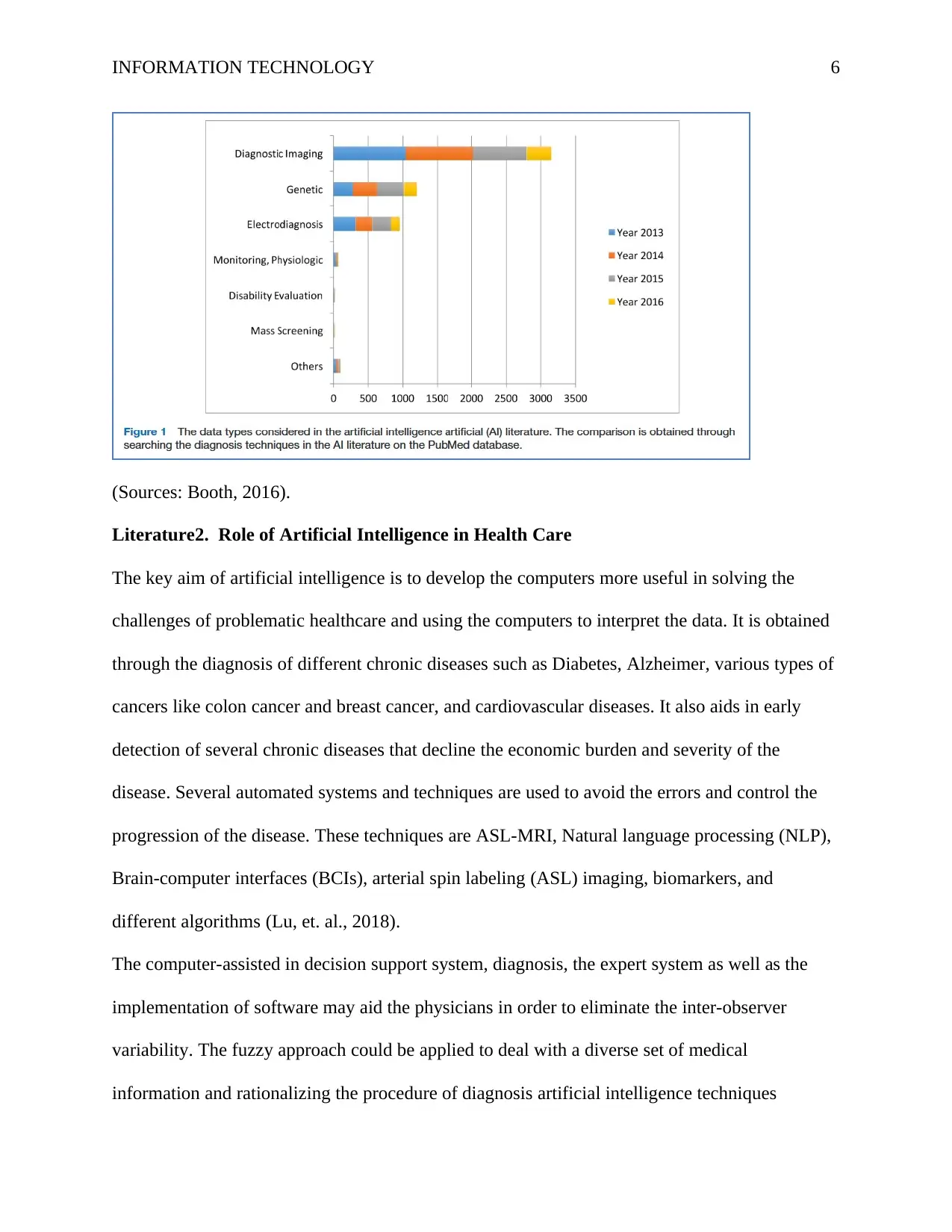
INFORMATION TECHNOLOGY 6
(Sources: Booth, 2016).
Literature2. Role of Artificial Intelligence in Health Care
The key aim of artificial intelligence is to develop the computers more useful in solving the
challenges of problematic healthcare and using the computers to interpret the data. It is obtained
through the diagnosis of different chronic diseases such as Diabetes, Alzheimer, various types of
cancers like colon cancer and breast cancer, and cardiovascular diseases. It also aids in early
detection of several chronic diseases that decline the economic burden and severity of the
disease. Several automated systems and techniques are used to avoid the errors and control the
progression of the disease. These techniques are ASL-MRI, Natural language processing (NLP),
Brain-computer interfaces (BCIs), arterial spin labeling (ASL) imaging, biomarkers, and
different algorithms (Lu, et. al., 2018).
The computer-assisted in decision support system, diagnosis, the expert system as well as the
implementation of software may aid the physicians in order to eliminate the inter-observer
variability. The fuzzy approach could be applied to deal with a diverse set of medical
information and rationalizing the procedure of diagnosis artificial intelligence techniques
(Sources: Booth, 2016).
Literature2. Role of Artificial Intelligence in Health Care
The key aim of artificial intelligence is to develop the computers more useful in solving the
challenges of problematic healthcare and using the computers to interpret the data. It is obtained
through the diagnosis of different chronic diseases such as Diabetes, Alzheimer, various types of
cancers like colon cancer and breast cancer, and cardiovascular diseases. It also aids in early
detection of several chronic diseases that decline the economic burden and severity of the
disease. Several automated systems and techniques are used to avoid the errors and control the
progression of the disease. These techniques are ASL-MRI, Natural language processing (NLP),
Brain-computer interfaces (BCIs), arterial spin labeling (ASL) imaging, biomarkers, and
different algorithms (Lu, et. al., 2018).
The computer-assisted in decision support system, diagnosis, the expert system as well as the
implementation of software may aid the physicians in order to eliminate the inter-observer
variability. The fuzzy approach could be applied to deal with a diverse set of medical
information and rationalizing the procedure of diagnosis artificial intelligence techniques
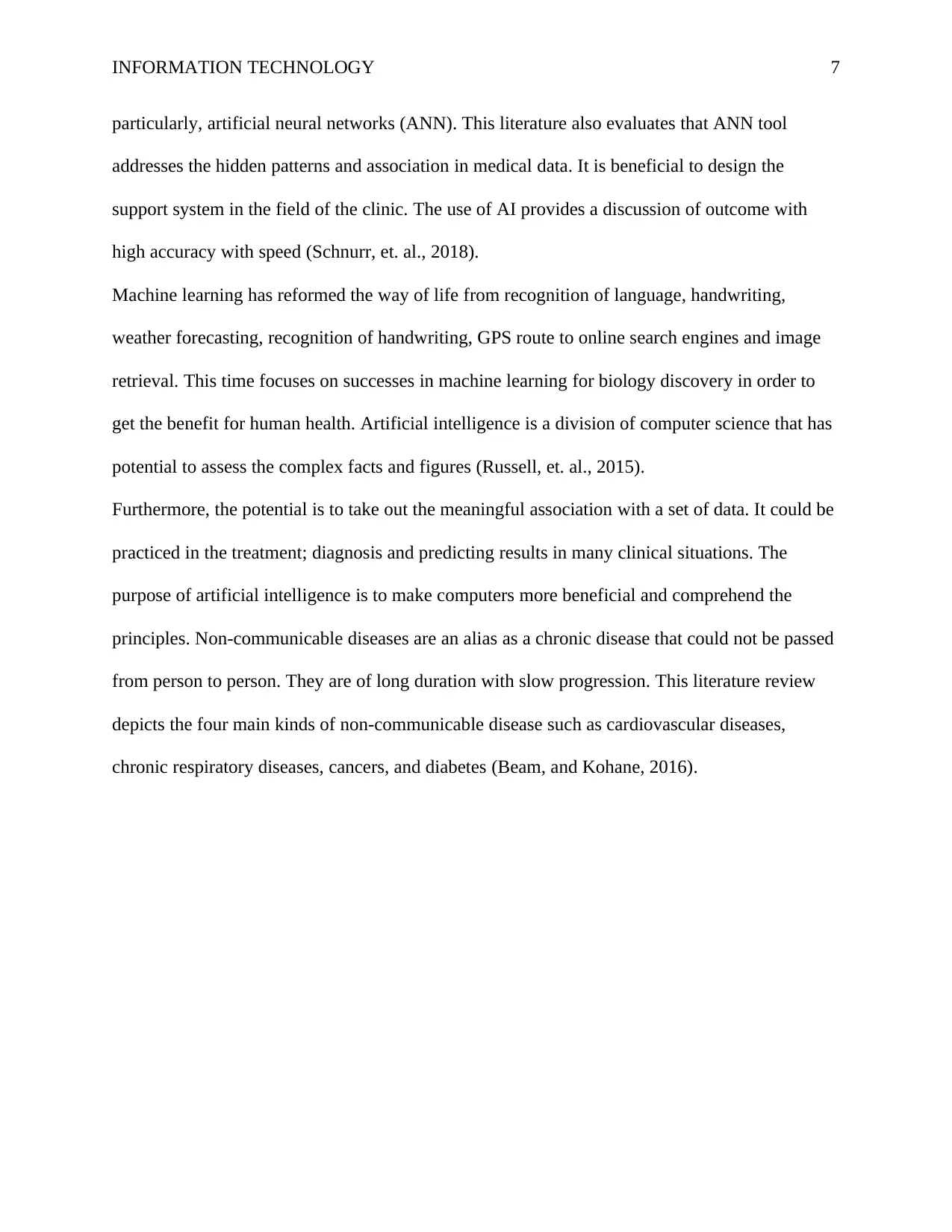
INFORMATION TECHNOLOGY 7
particularly, artificial neural networks (ANN). This literature also evaluates that ANN tool
addresses the hidden patterns and association in medical data. It is beneficial to design the
support system in the field of the clinic. The use of AI provides a discussion of outcome with
high accuracy with speed (Schnurr, et. al., 2018).
Machine learning has reformed the way of life from recognition of language, handwriting,
weather forecasting, recognition of handwriting, GPS route to online search engines and image
retrieval. This time focuses on successes in machine learning for biology discovery in order to
get the benefit for human health. Artificial intelligence is a division of computer science that has
potential to assess the complex facts and figures (Russell, et. al., 2015).
Furthermore, the potential is to take out the meaningful association with a set of data. It could be
practiced in the treatment; diagnosis and predicting results in many clinical situations. The
purpose of artificial intelligence is to make computers more beneficial and comprehend the
principles. Non-communicable diseases are an alias as a chronic disease that could not be passed
from person to person. They are of long duration with slow progression. This literature review
depicts the four main kinds of non-communicable disease such as cardiovascular diseases,
chronic respiratory diseases, cancers, and diabetes (Beam, and Kohane, 2016).
particularly, artificial neural networks (ANN). This literature also evaluates that ANN tool
addresses the hidden patterns and association in medical data. It is beneficial to design the
support system in the field of the clinic. The use of AI provides a discussion of outcome with
high accuracy with speed (Schnurr, et. al., 2018).
Machine learning has reformed the way of life from recognition of language, handwriting,
weather forecasting, recognition of handwriting, GPS route to online search engines and image
retrieval. This time focuses on successes in machine learning for biology discovery in order to
get the benefit for human health. Artificial intelligence is a division of computer science that has
potential to assess the complex facts and figures (Russell, et. al., 2015).
Furthermore, the potential is to take out the meaningful association with a set of data. It could be
practiced in the treatment; diagnosis and predicting results in many clinical situations. The
purpose of artificial intelligence is to make computers more beneficial and comprehend the
principles. Non-communicable diseases are an alias as a chronic disease that could not be passed
from person to person. They are of long duration with slow progression. This literature review
depicts the four main kinds of non-communicable disease such as cardiovascular diseases,
chronic respiratory diseases, cancers, and diabetes (Beam, and Kohane, 2016).
Paraphrase This Document
Need a fresh take? Get an instant paraphrase of this document with our AI Paraphraser
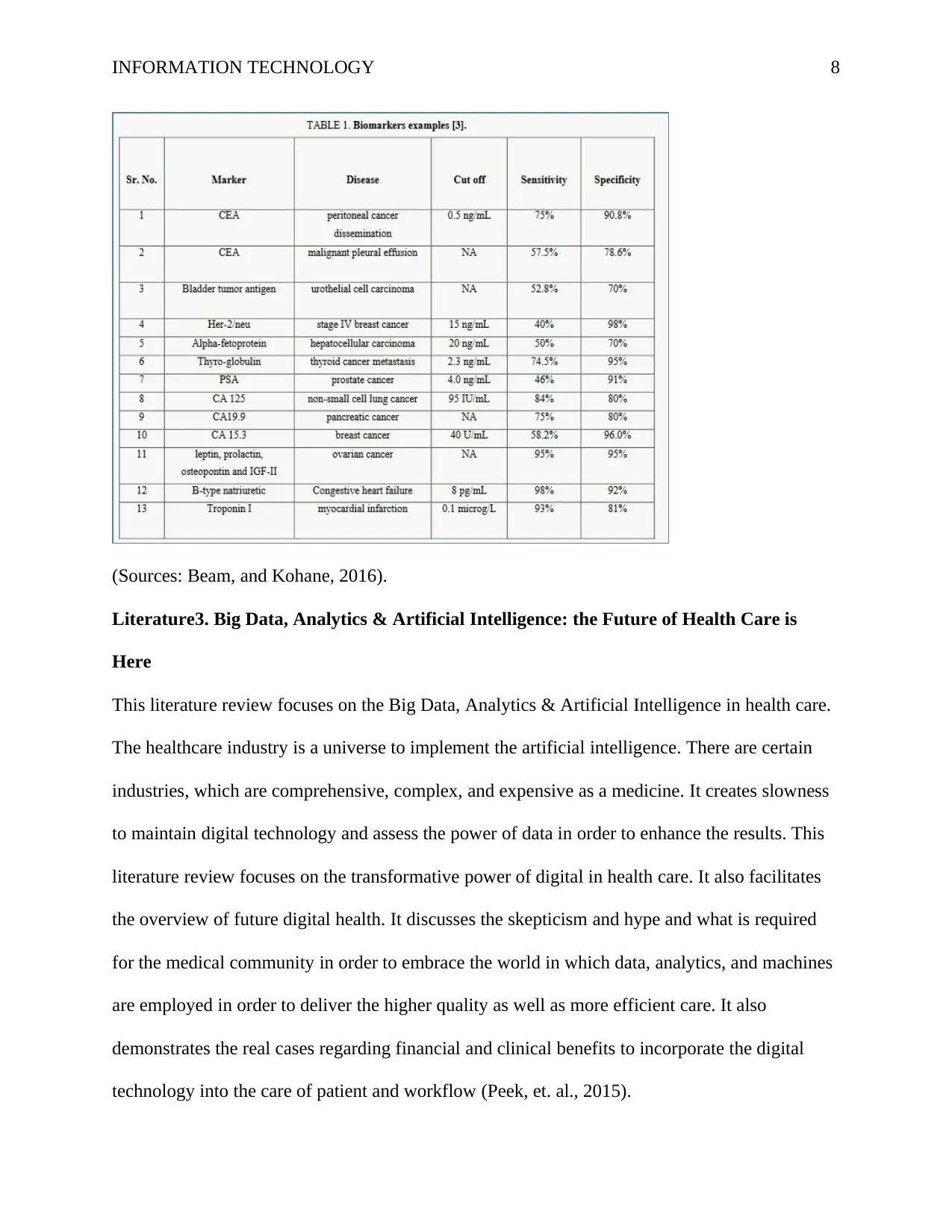
INFORMATION TECHNOLOGY 8
(Sources: Beam, and Kohane, 2016).
Literature3. Big Data, Analytics & Artificial Intelligence: the Future of Health Care is
Here
This literature review focuses on the Big Data, Analytics & Artificial Intelligence in health care.
The healthcare industry is a universe to implement the artificial intelligence. There are certain
industries, which are comprehensive, complex, and expensive as a medicine. It creates slowness
to maintain digital technology and assess the power of data in order to enhance the results. This
literature review focuses on the transformative power of digital in health care. It also facilitates
the overview of future digital health. It discusses the skepticism and hype and what is required
for the medical community in order to embrace the world in which data, analytics, and machines
are employed in order to deliver the higher quality as well as more efficient care. It also
demonstrates the real cases regarding financial and clinical benefits to incorporate the digital
technology into the care of patient and workflow (Peek, et. al., 2015).
(Sources: Beam, and Kohane, 2016).
Literature3. Big Data, Analytics & Artificial Intelligence: the Future of Health Care is
Here
This literature review focuses on the Big Data, Analytics & Artificial Intelligence in health care.
The healthcare industry is a universe to implement the artificial intelligence. There are certain
industries, which are comprehensive, complex, and expensive as a medicine. It creates slowness
to maintain digital technology and assess the power of data in order to enhance the results. This
literature review focuses on the transformative power of digital in health care. It also facilitates
the overview of future digital health. It discusses the skepticism and hype and what is required
for the medical community in order to embrace the world in which data, analytics, and machines
are employed in order to deliver the higher quality as well as more efficient care. It also
demonstrates the real cases regarding financial and clinical benefits to incorporate the digital
technology into the care of patient and workflow (Peek, et. al., 2015).
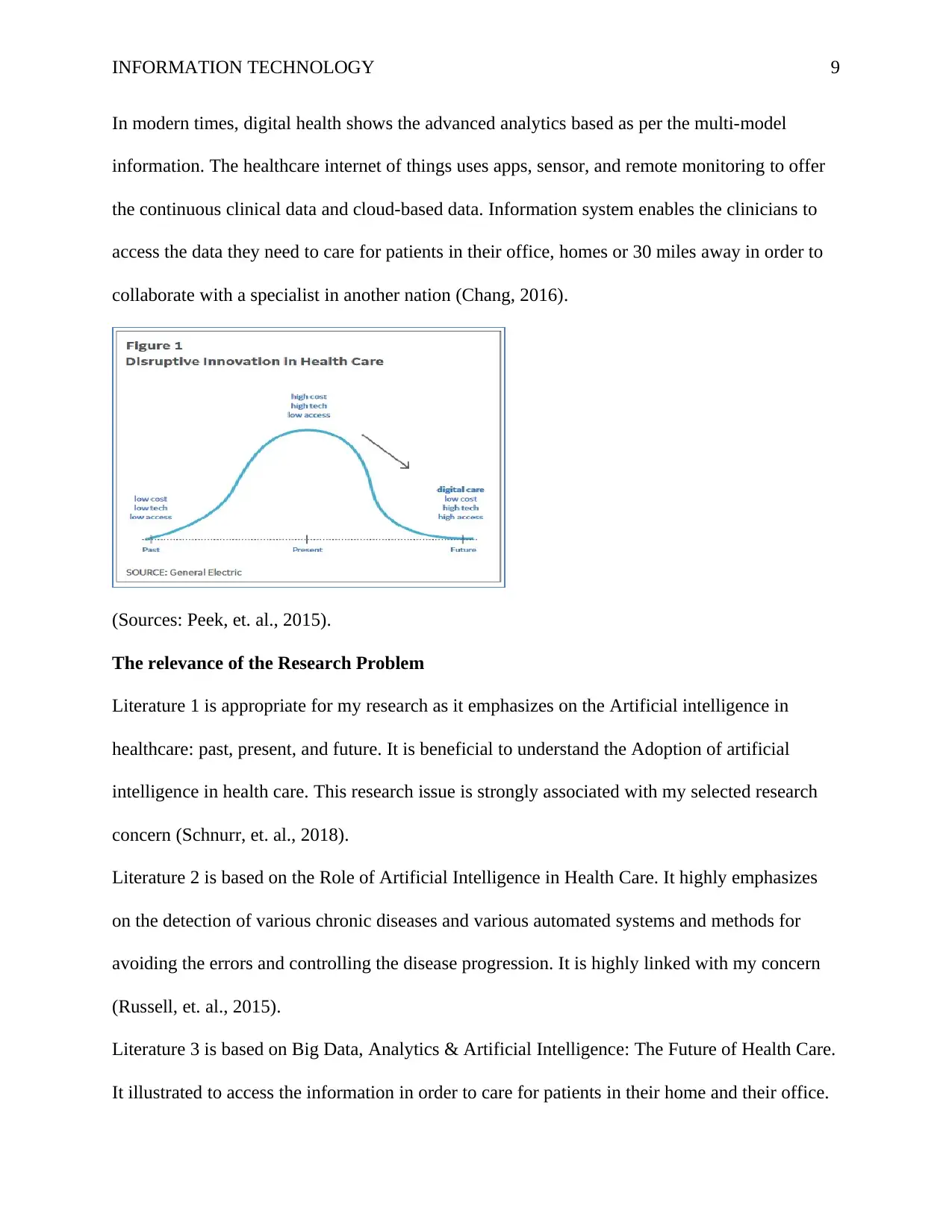
INFORMATION TECHNOLOGY 9
In modern times, digital health shows the advanced analytics based as per the multi-model
information. The healthcare internet of things uses apps, sensor, and remote monitoring to offer
the continuous clinical data and cloud-based data. Information system enables the clinicians to
access the data they need to care for patients in their office, homes or 30 miles away in order to
collaborate with a specialist in another nation (Chang, 2016).
(Sources: Peek, et. al., 2015).
The relevance of the Research Problem
Literature 1 is appropriate for my research as it emphasizes on the Artificial intelligence in
healthcare: past, present, and future. It is beneficial to understand the Adoption of artificial
intelligence in health care. This research issue is strongly associated with my selected research
concern (Schnurr, et. al., 2018).
Literature 2 is based on the Role of Artificial Intelligence in Health Care. It highly emphasizes
on the detection of various chronic diseases and various automated systems and methods for
avoiding the errors and controlling the disease progression. It is highly linked with my concern
(Russell, et. al., 2015).
Literature 3 is based on Big Data, Analytics & Artificial Intelligence: The Future of Health Care.
It illustrated to access the information in order to care for patients in their home and their office.
In modern times, digital health shows the advanced analytics based as per the multi-model
information. The healthcare internet of things uses apps, sensor, and remote monitoring to offer
the continuous clinical data and cloud-based data. Information system enables the clinicians to
access the data they need to care for patients in their office, homes or 30 miles away in order to
collaborate with a specialist in another nation (Chang, 2016).
(Sources: Peek, et. al., 2015).
The relevance of the Research Problem
Literature 1 is appropriate for my research as it emphasizes on the Artificial intelligence in
healthcare: past, present, and future. It is beneficial to understand the Adoption of artificial
intelligence in health care. This research issue is strongly associated with my selected research
concern (Schnurr, et. al., 2018).
Literature 2 is based on the Role of Artificial Intelligence in Health Care. It highly emphasizes
on the detection of various chronic diseases and various automated systems and methods for
avoiding the errors and controlling the disease progression. It is highly linked with my concern
(Russell, et. al., 2015).
Literature 3 is based on Big Data, Analytics & Artificial Intelligence: The Future of Health Care.
It illustrated to access the information in order to care for patients in their home and their office.
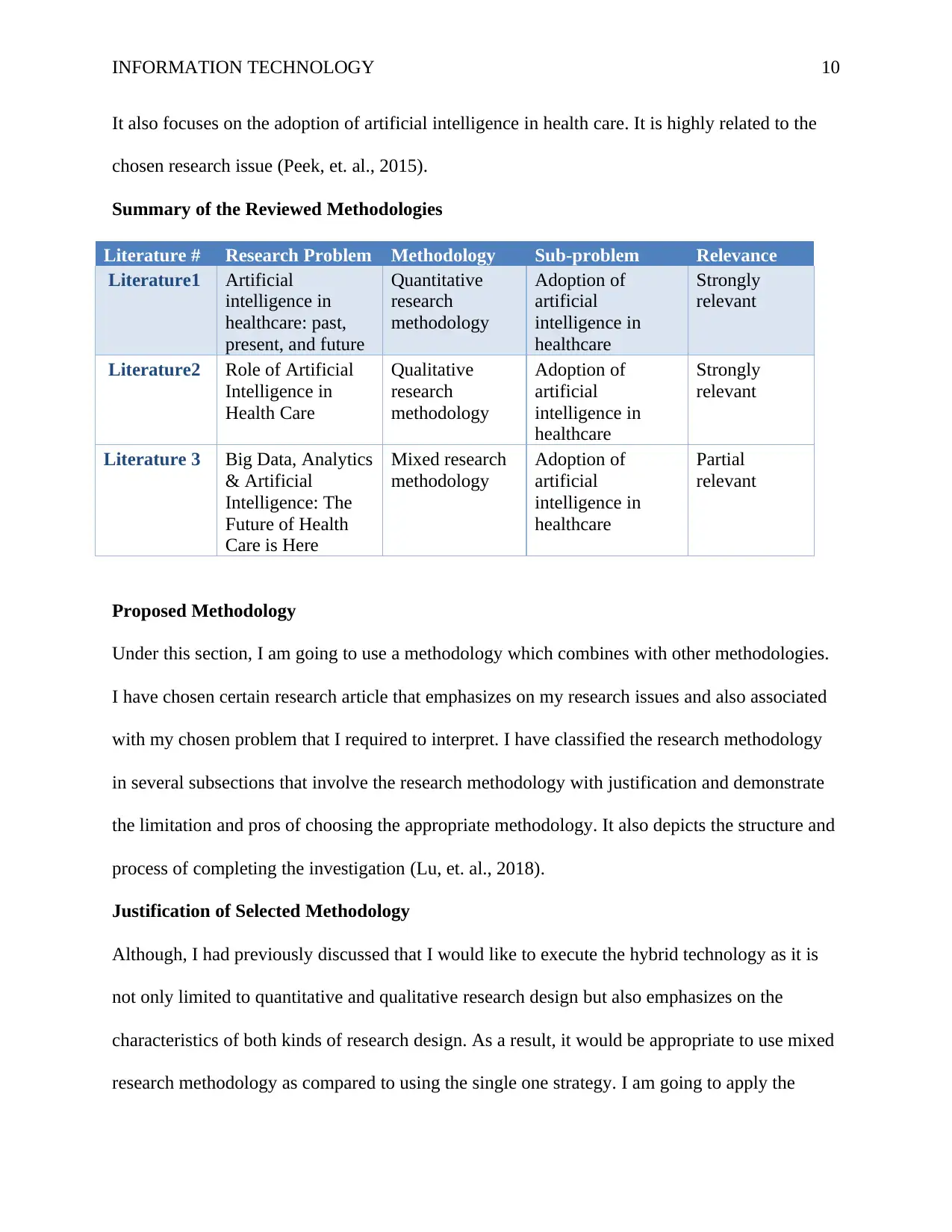
INFORMATION TECHNOLOGY 10
It also focuses on the adoption of artificial intelligence in health care. It is highly related to the
chosen research issue (Peek, et. al., 2015).
Summary of the Reviewed Methodologies
Literature # Research Problem Methodology Sub-problem Relevance
Literature1 Artificial
intelligence in
healthcare: past,
present, and future
Quantitative
research
methodology
Adoption of
artificial
intelligence in
healthcare
Strongly
relevant
Literature2 Role of Artificial
Intelligence in
Health Care
Qualitative
research
methodology
Adoption of
artificial
intelligence in
healthcare
Strongly
relevant
Literature 3 Big Data, Analytics
& Artificial
Intelligence: The
Future of Health
Care is Here
Mixed research
methodology
Adoption of
artificial
intelligence in
healthcare
Partial
relevant
Proposed Methodology
Under this section, I am going to use a methodology which combines with other methodologies.
I have chosen certain research article that emphasizes on my research issues and also associated
with my chosen problem that I required to interpret. I have classified the research methodology
in several subsections that involve the research methodology with justification and demonstrate
the limitation and pros of choosing the appropriate methodology. It also depicts the structure and
process of completing the investigation (Lu, et. al., 2018).
Justification of Selected Methodology
Although, I had previously discussed that I would like to execute the hybrid technology as it is
not only limited to quantitative and qualitative research design but also emphasizes on the
characteristics of both kinds of research design. As a result, it would be appropriate to use mixed
research methodology as compared to using the single one strategy. I am going to apply the
It also focuses on the adoption of artificial intelligence in health care. It is highly related to the
chosen research issue (Peek, et. al., 2015).
Summary of the Reviewed Methodologies
Literature # Research Problem Methodology Sub-problem Relevance
Literature1 Artificial
intelligence in
healthcare: past,
present, and future
Quantitative
research
methodology
Adoption of
artificial
intelligence in
healthcare
Strongly
relevant
Literature2 Role of Artificial
Intelligence in
Health Care
Qualitative
research
methodology
Adoption of
artificial
intelligence in
healthcare
Strongly
relevant
Literature 3 Big Data, Analytics
& Artificial
Intelligence: The
Future of Health
Care is Here
Mixed research
methodology
Adoption of
artificial
intelligence in
healthcare
Partial
relevant
Proposed Methodology
Under this section, I am going to use a methodology which combines with other methodologies.
I have chosen certain research article that emphasizes on my research issues and also associated
with my chosen problem that I required to interpret. I have classified the research methodology
in several subsections that involve the research methodology with justification and demonstrate
the limitation and pros of choosing the appropriate methodology. It also depicts the structure and
process of completing the investigation (Lu, et. al., 2018).
Justification of Selected Methodology
Although, I had previously discussed that I would like to execute the hybrid technology as it is
not only limited to quantitative and qualitative research design but also emphasizes on the
characteristics of both kinds of research design. As a result, it would be appropriate to use mixed
research methodology as compared to using the single one strategy. I am going to apply the
Secure Best Marks with AI Grader
Need help grading? Try our AI Grader for instant feedback on your assignments.
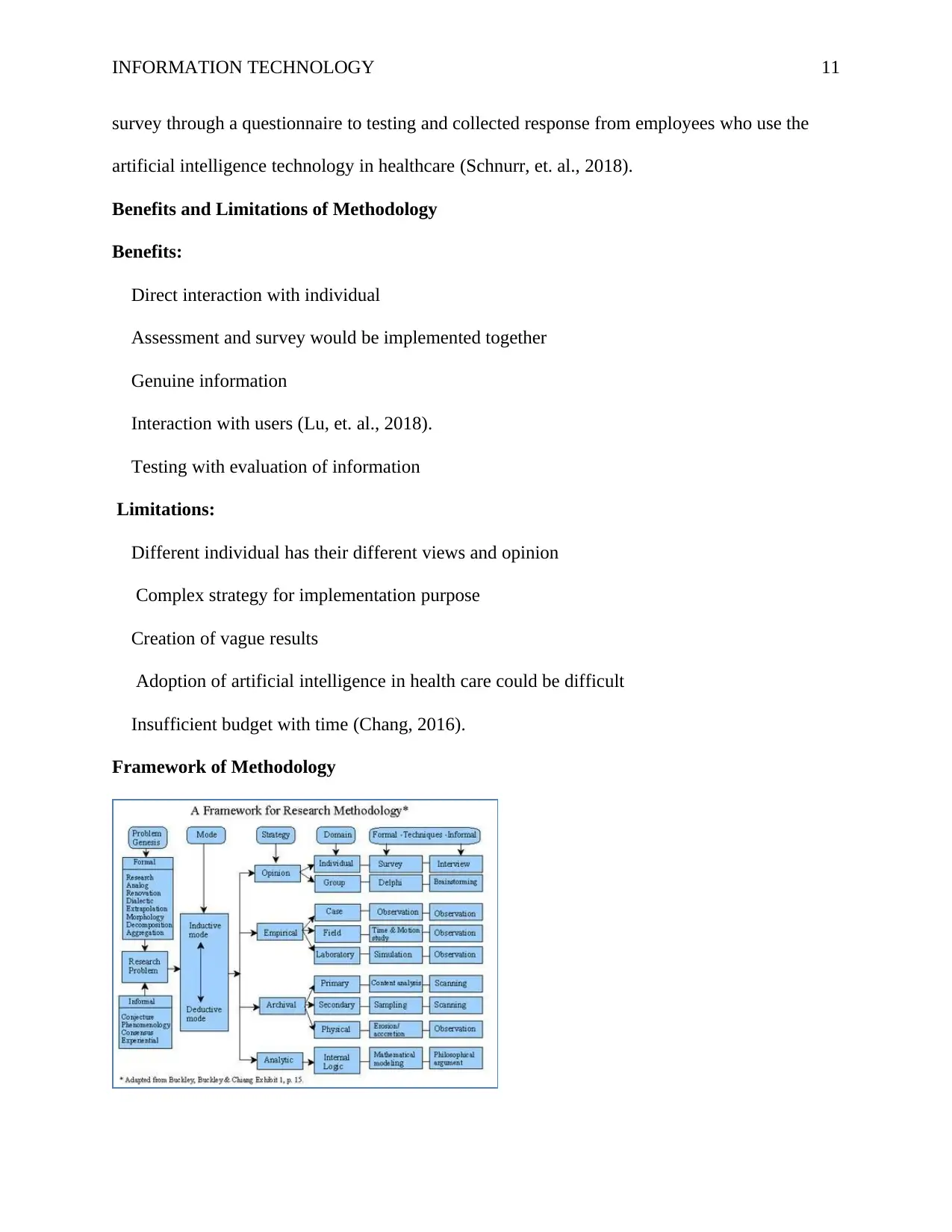
INFORMATION TECHNOLOGY 11
survey through a questionnaire to testing and collected response from employees who use the
artificial intelligence technology in healthcare (Schnurr, et. al., 2018).
Benefits and Limitations of Methodology
Benefits:
Direct interaction with individual
Assessment and survey would be implemented together
Genuine information
Interaction with users (Lu, et. al., 2018).
Testing with evaluation of information
Limitations:
Different individual has their different views and opinion
Complex strategy for implementation purpose
Creation of vague results
Adoption of artificial intelligence in health care could be difficult
Insufficient budget with time (Chang, 2016).
Framework of Methodology
survey through a questionnaire to testing and collected response from employees who use the
artificial intelligence technology in healthcare (Schnurr, et. al., 2018).
Benefits and Limitations of Methodology
Benefits:
Direct interaction with individual
Assessment and survey would be implemented together
Genuine information
Interaction with users (Lu, et. al., 2018).
Testing with evaluation of information
Limitations:
Different individual has their different views and opinion
Complex strategy for implementation purpose
Creation of vague results
Adoption of artificial intelligence in health care could be difficult
Insufficient budget with time (Chang, 2016).
Framework of Methodology
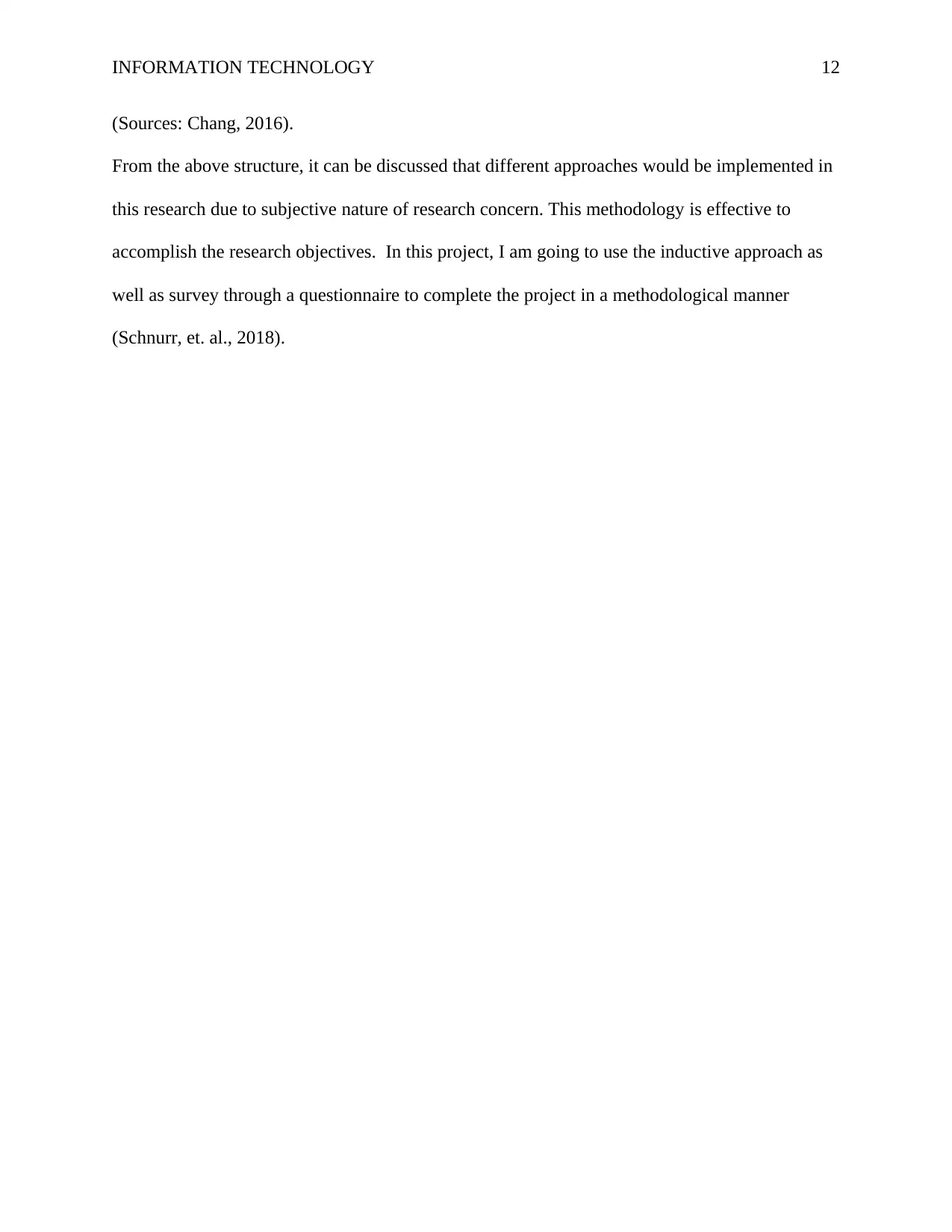
INFORMATION TECHNOLOGY 12
(Sources: Chang, 2016).
From the above structure, it can be discussed that different approaches would be implemented in
this research due to subjective nature of research concern. This methodology is effective to
accomplish the research objectives. In this project, I am going to use the inductive approach as
well as survey through a questionnaire to complete the project in a methodological manner
(Schnurr, et. al., 2018).
(Sources: Chang, 2016).
From the above structure, it can be discussed that different approaches would be implemented in
this research due to subjective nature of research concern. This methodology is effective to
accomplish the research objectives. In this project, I am going to use the inductive approach as
well as survey through a questionnaire to complete the project in a methodological manner
(Schnurr, et. al., 2018).
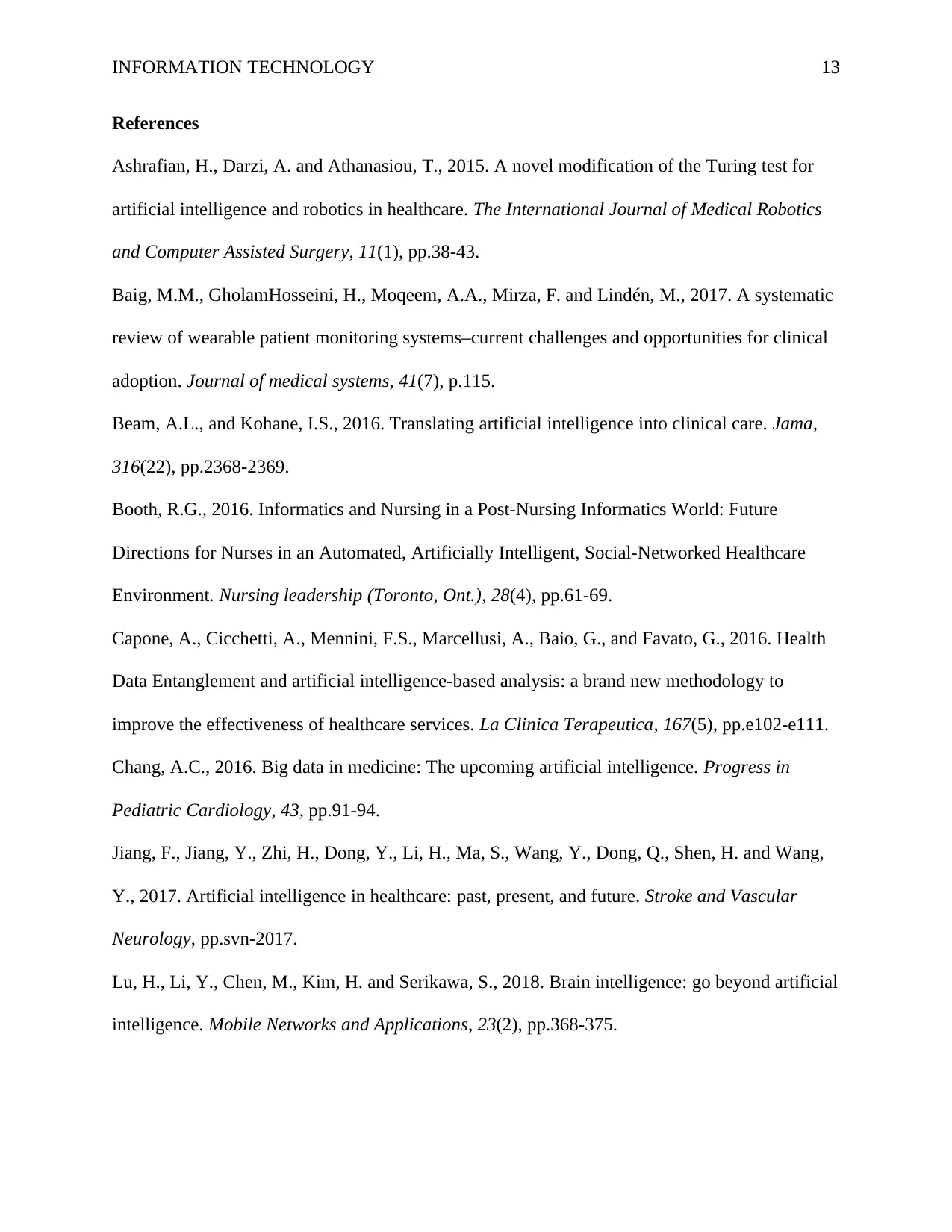
INFORMATION TECHNOLOGY 13
References
Ashrafian, H., Darzi, A. and Athanasiou, T., 2015. A novel modification of the Turing test for
artificial intelligence and robotics in healthcare. The International Journal of Medical Robotics
and Computer Assisted Surgery, 11(1), pp.38-43.
Baig, M.M., GholamHosseini, H., Moqeem, A.A., Mirza, F. and Lindén, M., 2017. A systematic
review of wearable patient monitoring systems–current challenges and opportunities for clinical
adoption. Journal of medical systems, 41(7), p.115.
Beam, A.L., and Kohane, I.S., 2016. Translating artificial intelligence into clinical care. Jama,
316(22), pp.2368-2369.
Booth, R.G., 2016. Informatics and Nursing in a Post-Nursing Informatics World: Future
Directions for Nurses in an Automated, Artificially Intelligent, Social-Networked Healthcare
Environment. Nursing leadership (Toronto, Ont.), 28(4), pp.61-69.
Capone, A., Cicchetti, A., Mennini, F.S., Marcellusi, A., Baio, G., and Favato, G., 2016. Health
Data Entanglement and artificial intelligence-based analysis: a brand new methodology to
improve the effectiveness of healthcare services. La Clinica Terapeutica, 167(5), pp.e102-e111.
Chang, A.C., 2016. Big data in medicine: The upcoming artificial intelligence. Progress in
Pediatric Cardiology, 43, pp.91-94.
Jiang, F., Jiang, Y., Zhi, H., Dong, Y., Li, H., Ma, S., Wang, Y., Dong, Q., Shen, H. and Wang,
Y., 2017. Artificial intelligence in healthcare: past, present, and future. Stroke and Vascular
Neurology, pp.svn-2017.
Lu, H., Li, Y., Chen, M., Kim, H. and Serikawa, S., 2018. Brain intelligence: go beyond artificial
intelligence. Mobile Networks and Applications, 23(2), pp.368-375.
References
Ashrafian, H., Darzi, A. and Athanasiou, T., 2015. A novel modification of the Turing test for
artificial intelligence and robotics in healthcare. The International Journal of Medical Robotics
and Computer Assisted Surgery, 11(1), pp.38-43.
Baig, M.M., GholamHosseini, H., Moqeem, A.A., Mirza, F. and Lindén, M., 2017. A systematic
review of wearable patient monitoring systems–current challenges and opportunities for clinical
adoption. Journal of medical systems, 41(7), p.115.
Beam, A.L., and Kohane, I.S., 2016. Translating artificial intelligence into clinical care. Jama,
316(22), pp.2368-2369.
Booth, R.G., 2016. Informatics and Nursing in a Post-Nursing Informatics World: Future
Directions for Nurses in an Automated, Artificially Intelligent, Social-Networked Healthcare
Environment. Nursing leadership (Toronto, Ont.), 28(4), pp.61-69.
Capone, A., Cicchetti, A., Mennini, F.S., Marcellusi, A., Baio, G., and Favato, G., 2016. Health
Data Entanglement and artificial intelligence-based analysis: a brand new methodology to
improve the effectiveness of healthcare services. La Clinica Terapeutica, 167(5), pp.e102-e111.
Chang, A.C., 2016. Big data in medicine: The upcoming artificial intelligence. Progress in
Pediatric Cardiology, 43, pp.91-94.
Jiang, F., Jiang, Y., Zhi, H., Dong, Y., Li, H., Ma, S., Wang, Y., Dong, Q., Shen, H. and Wang,
Y., 2017. Artificial intelligence in healthcare: past, present, and future. Stroke and Vascular
Neurology, pp.svn-2017.
Lu, H., Li, Y., Chen, M., Kim, H. and Serikawa, S., 2018. Brain intelligence: go beyond artificial
intelligence. Mobile Networks and Applications, 23(2), pp.368-375.
Paraphrase This Document
Need a fresh take? Get an instant paraphrase of this document with our AI Paraphraser
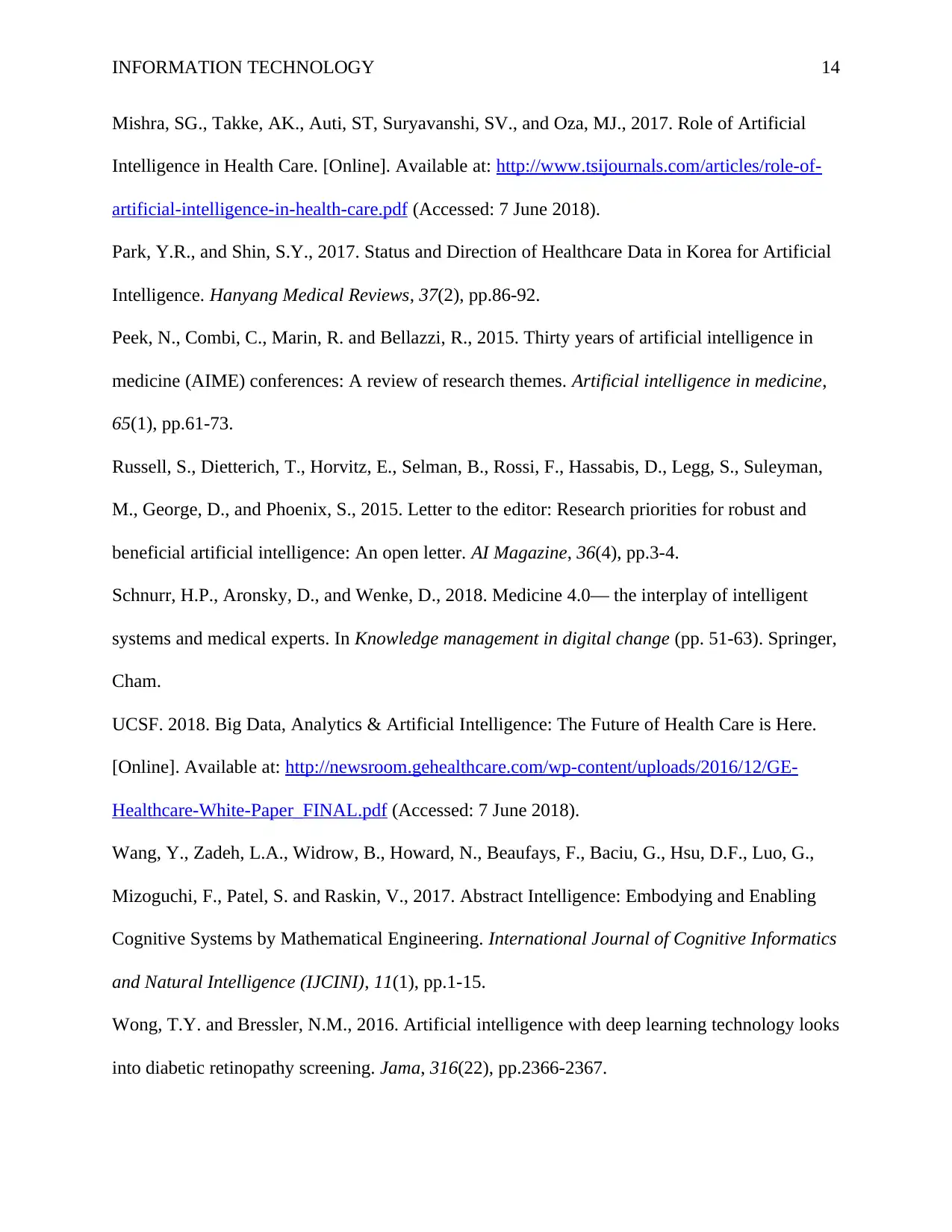
INFORMATION TECHNOLOGY 14
Mishra, SG., Takke, AK., Auti, ST, Suryavanshi, SV., and Oza, MJ., 2017. Role of Artificial
Intelligence in Health Care. [Online]. Available at: http://www.tsijournals.com/articles/role-of-
artificial-intelligence-in-health-care.pdf (Accessed: 7 June 2018).
Park, Y.R., and Shin, S.Y., 2017. Status and Direction of Healthcare Data in Korea for Artificial
Intelligence. Hanyang Medical Reviews, 37(2), pp.86-92.
Peek, N., Combi, C., Marin, R. and Bellazzi, R., 2015. Thirty years of artificial intelligence in
medicine (AIME) conferences: A review of research themes. Artificial intelligence in medicine,
65(1), pp.61-73.
Russell, S., Dietterich, T., Horvitz, E., Selman, B., Rossi, F., Hassabis, D., Legg, S., Suleyman,
M., George, D., and Phoenix, S., 2015. Letter to the editor: Research priorities for robust and
beneficial artificial intelligence: An open letter. AI Magazine, 36(4), pp.3-4.
Schnurr, H.P., Aronsky, D., and Wenke, D., 2018. Medicine 4.0— the interplay of intelligent
systems and medical experts. In Knowledge management in digital change (pp. 51-63). Springer,
Cham.
UCSF. 2018. Big Data, Analytics & Artificial Intelligence: The Future of Health Care is Here.
[Online]. Available at: http://newsroom.gehealthcare.com/wp-content/uploads/2016/12/GE-
Healthcare-White-Paper_FINAL.pdf (Accessed: 7 June 2018).
Wang, Y., Zadeh, L.A., Widrow, B., Howard, N., Beaufays, F., Baciu, G., Hsu, D.F., Luo, G.,
Mizoguchi, F., Patel, S. and Raskin, V., 2017. Abstract Intelligence: Embodying and Enabling
Cognitive Systems by Mathematical Engineering. International Journal of Cognitive Informatics
and Natural Intelligence (IJCINI), 11(1), pp.1-15.
Wong, T.Y. and Bressler, N.M., 2016. Artificial intelligence with deep learning technology looks
into diabetic retinopathy screening. Jama, 316(22), pp.2366-2367.
Mishra, SG., Takke, AK., Auti, ST, Suryavanshi, SV., and Oza, MJ., 2017. Role of Artificial
Intelligence in Health Care. [Online]. Available at: http://www.tsijournals.com/articles/role-of-
artificial-intelligence-in-health-care.pdf (Accessed: 7 June 2018).
Park, Y.R., and Shin, S.Y., 2017. Status and Direction of Healthcare Data in Korea for Artificial
Intelligence. Hanyang Medical Reviews, 37(2), pp.86-92.
Peek, N., Combi, C., Marin, R. and Bellazzi, R., 2015. Thirty years of artificial intelligence in
medicine (AIME) conferences: A review of research themes. Artificial intelligence in medicine,
65(1), pp.61-73.
Russell, S., Dietterich, T., Horvitz, E., Selman, B., Rossi, F., Hassabis, D., Legg, S., Suleyman,
M., George, D., and Phoenix, S., 2015. Letter to the editor: Research priorities for robust and
beneficial artificial intelligence: An open letter. AI Magazine, 36(4), pp.3-4.
Schnurr, H.P., Aronsky, D., and Wenke, D., 2018. Medicine 4.0— the interplay of intelligent
systems and medical experts. In Knowledge management in digital change (pp. 51-63). Springer,
Cham.
UCSF. 2018. Big Data, Analytics & Artificial Intelligence: The Future of Health Care is Here.
[Online]. Available at: http://newsroom.gehealthcare.com/wp-content/uploads/2016/12/GE-
Healthcare-White-Paper_FINAL.pdf (Accessed: 7 June 2018).
Wang, Y., Zadeh, L.A., Widrow, B., Howard, N., Beaufays, F., Baciu, G., Hsu, D.F., Luo, G.,
Mizoguchi, F., Patel, S. and Raskin, V., 2017. Abstract Intelligence: Embodying and Enabling
Cognitive Systems by Mathematical Engineering. International Journal of Cognitive Informatics
and Natural Intelligence (IJCINI), 11(1), pp.1-15.
Wong, T.Y. and Bressler, N.M., 2016. Artificial intelligence with deep learning technology looks
into diabetic retinopathy screening. Jama, 316(22), pp.2366-2367.
1 out of 14
Related Documents
Your All-in-One AI-Powered Toolkit for Academic Success.
+13062052269
info@desklib.com
Available 24*7 on WhatsApp / Email
![[object Object]](/_next/static/media/star-bottom.7253800d.svg)
Unlock your academic potential
© 2024 | Zucol Services PVT LTD | All rights reserved.




